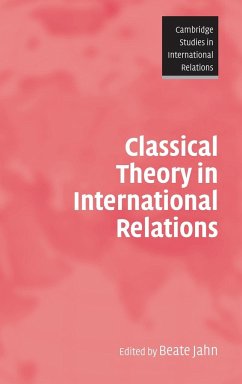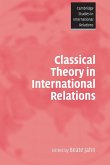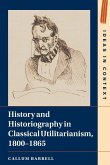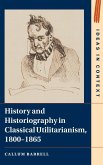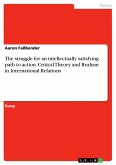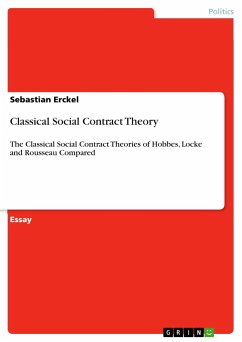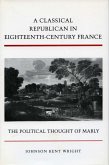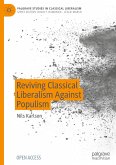An edited volume of essays demonstrating the importance of classical thinkers in international relations.
Classical political theorists such as Thucydides, Kant, Rousseau, Smith, Hegel, Grotius, Mill, Locke and Clausewitz are often employed to explain and justify contemporary international politics and are seen to constitute the different schools of thought in the discipline. However, traditional interpretations frequently ignore the intellectual and historical context in which these thinkers were writing as well as the lineages through which they came to be appropriated in International Relations. This collection of essays provides alternative interpretations sensitive to these political and intellectual contexts and to the trajectory of their appropriation. The political, sociological, anthropological, legal, economic, philosophical and normative dimensions are shown to be constitutive, not just of classical theories, but of international thought and practice in the contemporary world. Moreover, they challenge traditional accounts of timeless debates and schools of thought and provide new conceptions of core issues such as sovereignty, morality, law, property, imperialism and agency.
Table of contents:
1. Introduction: classical theory and international relations in context Beate Jahn; Part I. Intellectual Contexts: 2. Pericles, realism, and the normative conditions of deliberate action Sara Monoson and Michael Loriaux; 3. Immanuel Kant and the democratic peace John MacMillan; 4. 'One powerful and enlightened nation': Kant and the quest for a global rule of law Antonio Franceschet; 5. Rousseau and Saint-Pierre's peace project: a critique of 'history of international relations theory' Yuichi Aiko; Part II. Political Contexts: 6. The savage smith and the temporal walls of capitalism David L. Blaney and Naeem Inayatullah; 7. Property and propriety in international relations: the case of John Locke David Boucher; 8. Classical smoke, classical mirror: Kant and Mill in liberal international relations theory Beate Jahn; Part III. Lineages: 9. The 'other' in classical political theory: Re-contextualising the cosmopolitan/communitarian debate Robert Shilliam; 10. Images of Grotius Edward Keene; 11. The Hobbesian theory of international relations: three traditions Michael C. Williams; 12. Re-appropriating Clausewitz: the neglected dimensions of counter-strategic thought Julian Reid.
Hinweis: Dieser Artikel kann nur an eine deutsche Lieferadresse ausgeliefert werden.
Classical political theorists such as Thucydides, Kant, Rousseau, Smith, Hegel, Grotius, Mill, Locke and Clausewitz are often employed to explain and justify contemporary international politics and are seen to constitute the different schools of thought in the discipline. However, traditional interpretations frequently ignore the intellectual and historical context in which these thinkers were writing as well as the lineages through which they came to be appropriated in International Relations. This collection of essays provides alternative interpretations sensitive to these political and intellectual contexts and to the trajectory of their appropriation. The political, sociological, anthropological, legal, economic, philosophical and normative dimensions are shown to be constitutive, not just of classical theories, but of international thought and practice in the contemporary world. Moreover, they challenge traditional accounts of timeless debates and schools of thought and provide new conceptions of core issues such as sovereignty, morality, law, property, imperialism and agency.
Table of contents:
1. Introduction: classical theory and international relations in context Beate Jahn; Part I. Intellectual Contexts: 2. Pericles, realism, and the normative conditions of deliberate action Sara Monoson and Michael Loriaux; 3. Immanuel Kant and the democratic peace John MacMillan; 4. 'One powerful and enlightened nation': Kant and the quest for a global rule of law Antonio Franceschet; 5. Rousseau and Saint-Pierre's peace project: a critique of 'history of international relations theory' Yuichi Aiko; Part II. Political Contexts: 6. The savage smith and the temporal walls of capitalism David L. Blaney and Naeem Inayatullah; 7. Property and propriety in international relations: the case of John Locke David Boucher; 8. Classical smoke, classical mirror: Kant and Mill in liberal international relations theory Beate Jahn; Part III. Lineages: 9. The 'other' in classical political theory: Re-contextualising the cosmopolitan/communitarian debate Robert Shilliam; 10. Images of Grotius Edward Keene; 11. The Hobbesian theory of international relations: three traditions Michael C. Williams; 12. Re-appropriating Clausewitz: the neglected dimensions of counter-strategic thought Julian Reid.
Hinweis: Dieser Artikel kann nur an eine deutsche Lieferadresse ausgeliefert werden.

